As Street Dog Care in Kathmandu Grows, Community Attitude to Strays Is Shifting
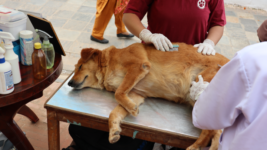
If you ever find yourself in the forecourt of the Boudhanath Stupa, a revered Buddhist monument located on the northeastern outskirts of Kathmandu city at about noon on a Saturday, you’re likely to come across a rainbow-coloured beach umbrella, with a street dog lying blissfully on a table.
Atisha, a blonde-haired dog who lives out in the open in the area around the stupa, was seated on the table when SCL arrived. And she was quite willing to allow the staff of Street Dog Care to groom and provide treatment to her after she’d already been served a washing.
Norbu, a first-timer, was next to be bathed, and, as he tentatively underwent a shampooing, Tenzin, an old-timer, turned up, as this stray punctually does every Saturday, and he seemed somewhat put out by having to wait his turn for the attention of staff in providing him his weekly day spa.
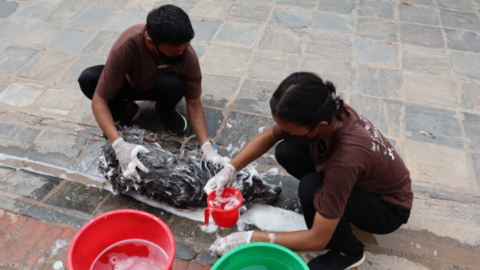
Street dogs have long been an issue in Kathmandu, where tens of thousands of the homeless canines roam the streets without owners. And many locals treat these stray animals like vermin to be shooed away, or even given a swift kicking to be moved on.
But these attitudes are changing and that’s due, in no small part, to the efforts of Street Dog Care and other nongovernment organisations like it.
Indeed, as people have witnessed the SDC staff going out of their way to look after and care for the homeless pooches, they’ve come to realise that the street dogs are deserving of their affection, rather than arbitrary harm.
And if you ever do come across this scene, as a stray dog is bathed, brushed and at times, deticked beneath the rainbow umbrella, it’s likely you’ll be struck by the warm feeling the simple act of watching other people making the effort to give such joy to these lonely dogs brings to an observer.

A whole-of-community approach
“In Kathmandu there are around 60,000 street dogs, and it’s because not many of the females are sterilised,” said Street Dog Care manager Junu Tamang. “The government does not do anything about this. We have to sterilise and neuter the dogs.”
“Only some NGOs are doing these kinds of things, so that’s why there’s such a big population,” the qualified veterinarian told Sydney Criminal Lawyers.
According to Tamang, there are three categories of stray dogs in Kathmandu: those born on the street that want nothing to do with humans, others born to the road that do desire the companionship of people, while the third type are dogs born to a home but then discarded.
The vet and her crew set up their treatment service for the dozens of dogs living around the stupa every weekend, and it serves to raise public awareness.
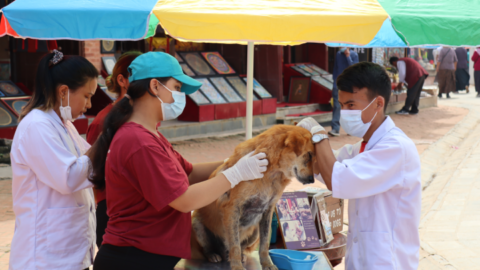
But Street Dog Care is a fulltime nonprofit operation funded by local and foreign donors and receives nothing from government.
SCL witnessed an Irish UNICEF worker turn up and offer to bring bandages on his regular flights from home to Nepal, and he then decided that he’d like to adopt one of the dogs, which is a possibility, as many of the strays cared for by SDC have since been sent overseas or adopted locally.
In the space of a few hours, two further tourists approach the setup and each of them reported a dog that they’d seen in distress. “Generally, most people will call and say they’ve seen a sick dog,” Tamang continues. “In many accident cases, we go out and get them.”

The evolution of goodwill
Established in 2009, Street Dog Care was founded by German woman Andrea Bringmann, who explained that she didn’t set out to create an organisation that cared for stray dogs, but rather she was concerned about just one she’d seen around the stupa area in a very bad condition.
So, Bringmann set up the umbrella care centre as a one-off, with the assistance of a vet. But during the day, a Buddhist monk showed up, insisting she needed donations, and he commenced collecting money from onlookers. And by the end of the day, there was enough to fund another session.
Andrea outlined that Street Dog Care has developed in this organic manner ever since. A local shop owner, who became aware of the service, donated land nearby for it to expand, while Bringmann was gifted the use of an empty house by another local who was living overseas.
The SDC founder added that the dogs around the stupa are in much better condition than 13 years ago, while she’s also watched community attitudes change towards them. And Andrea’s clear that government does little, except for an annual poisoned meat drop across the city to kill the dogs.
Today, Street Dog Care has a Boudha office close by the stupa, and it also has a large block of land out near the Kathmandu Valley city of Bhaktapur. And when Tamang is not tending the local office, she lives out at the property where she takes care of the 42 strays that live there.
“They may have had an accident and cannot survive on the street,” Junu explains. “So, we have to take them to the dog centre. Some dogs need long-term treatment. We have to give them good nutritional food. We keep blind, disabled and old age dogs at the centre.”
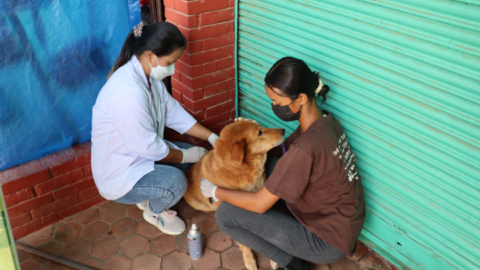
The annual vaccine drive
Once a year Street Dog Care goes around the Boudha area and vaccinates about 1,000 dogs, both domestic and strays, against the rabies virus.
So, SCL joined one of the four SDC groups who set out to prevent the dogs from capturing the fatal disease and in turn, from spreading it to humans. And it was uncanny to watch the vet and young volunteers simply stroll around the local area, knowing just where to locate the certain dogs.
The SDC staff explained that most of the street dogs live in a particular area, and they have built up trust with the animals, to the point where, each of the 70-odd strays that live around the stupa complex have a name.
And while some of the dogs aren’t so keen about getting the jab, they soon get over it.
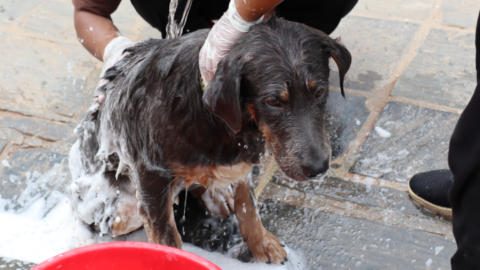
Tamang has worked for Street Dog Care for nine years now. And she makes clear that she does it out of her love for animals, especially the canine kind.
On being asked about the impact of the service, Junu said, “The dogs have gotten good treatment. And people are aware that if they see a sick dog, they have to call an organiser, who will come and treat it.”
“We are not run by the government, so we are running from local donors and foreigner donors,” the veterinarian said in conclusion, adding that anyone reading “can help by donating”.







